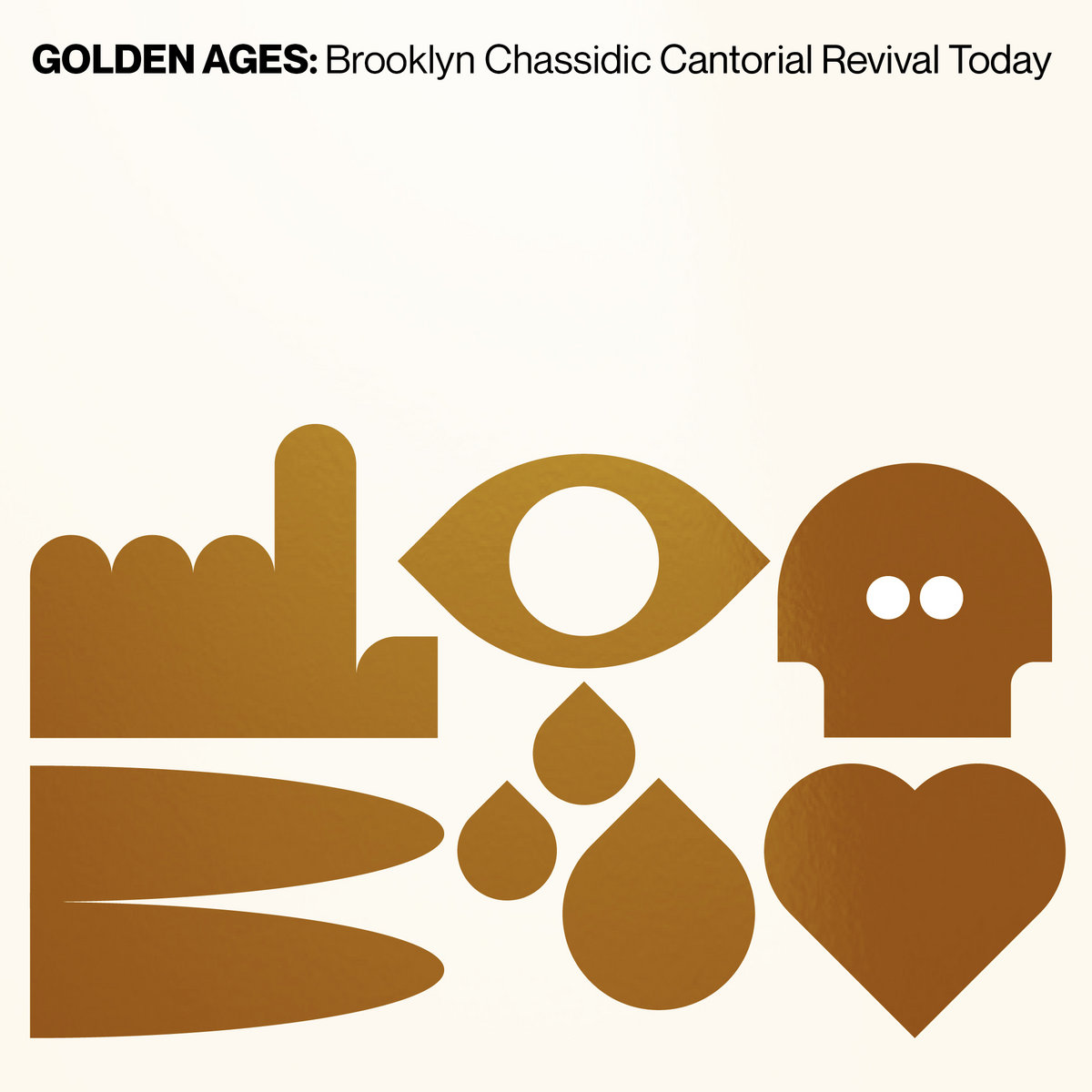
Golden Ages: Brooklyn Chassidic Cantorial Revival Today
Buy the album now on vinyl or digital formats
Official release date: December 2025. This is a reissue of the 2022 release.
Album cover art by Tomasz Jurecki.
In today’s Brooklyn, there is a remarkable music scene bubbling with life, hidden away from view of most music lovers. It is located in communities in Williamsburg and Borough Park, and its key players are young Chassidic singers. In the ultra-Orthodox community, older forms of Jewish music have largely been displaced by pop-music that sounds a lot like what you would hear on the mainstream radio, but with pious lyrics in Yiddish or prayer book Hebrew. A small but vibrant group of young singers have taken up the style of pre-World War Two cantorial music as their art form of choice, performing tracks recorded a century ago. Featuring stars of the Chassidic cantorial scene including Yanky Lemmer, Shimmy Miller and Yoel Kohn, this album documents the raw and vital sounds of communication across the divide of time. In a community that places many limits on self-expression, Chassidic cantorial revivalists have found creative voices by delving into the past. This recording project, produced at Brooklyn’s home of soul, Daptone Studios, is a celebration of new life paths and new sounds culled from the world of classic cantorial records.
The term cantorial “golden age” is understood by aficionados to refer to the music of international stars of Jewish music working in Eastern Europe and the Americas in the first decades of the twentieth century. The records of Gershon Sirota (1874-1943), Zawel Kwartin (1874-1952) and Yossele Rosenblatt (1882-1933), among others, continue to serve as a touchstone defining the sound and setting the standard for aesthetic achievement in the cantorial idiom. Early-twentieth century cantorial records presented an aestheticized version of Jewish liturgical folklore, simultaneously preserving elements of what was understood to be the sound of the Jewish past while at the same time innovating a modern approach to the liturgy that foregrounds the cantor as a performative creative persona. While the dramatic and visceral music of golden age cantors is marginal in the present-day American synagogue (in the Chassidic community, or otherwise), this body of work has been kept alive on reissue albums, and today circulates on the internet. Early cantorial records form the basis for the musical paths of the brilliant young voices heard on this album.
While cantors are typically understood as primarily functioning as prayer leaders, the work of cantorial revivalists is more often heard outside of the synagogue in concert venues, online and at music making parties. This album was inspired by one such party that took place in the summer of 2018 in Williamsburg. At this event in a private home on an unassuming side street in Brooklyn were assembled some of the finest voices in contemporary Jewish music. The recording session that produced this album represents an attempt to document some of the raw power and feeling of a cantorial jam session where artists perform within their community of deep lovers of the music.
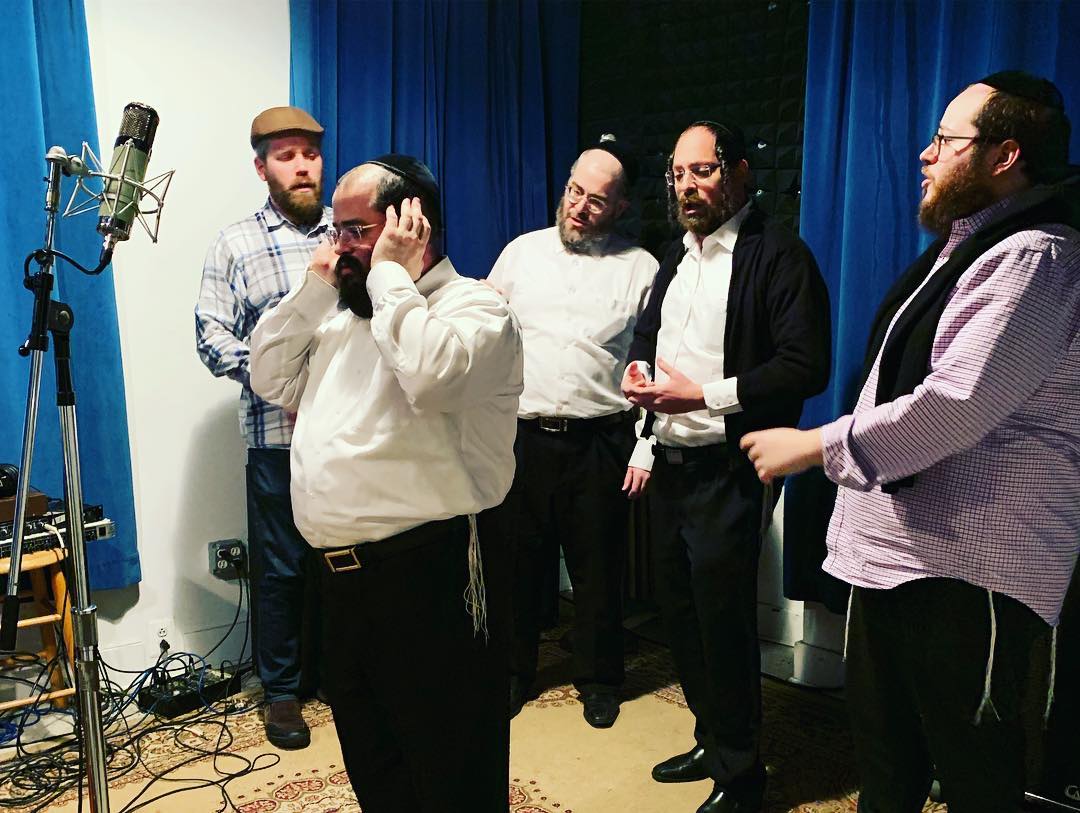
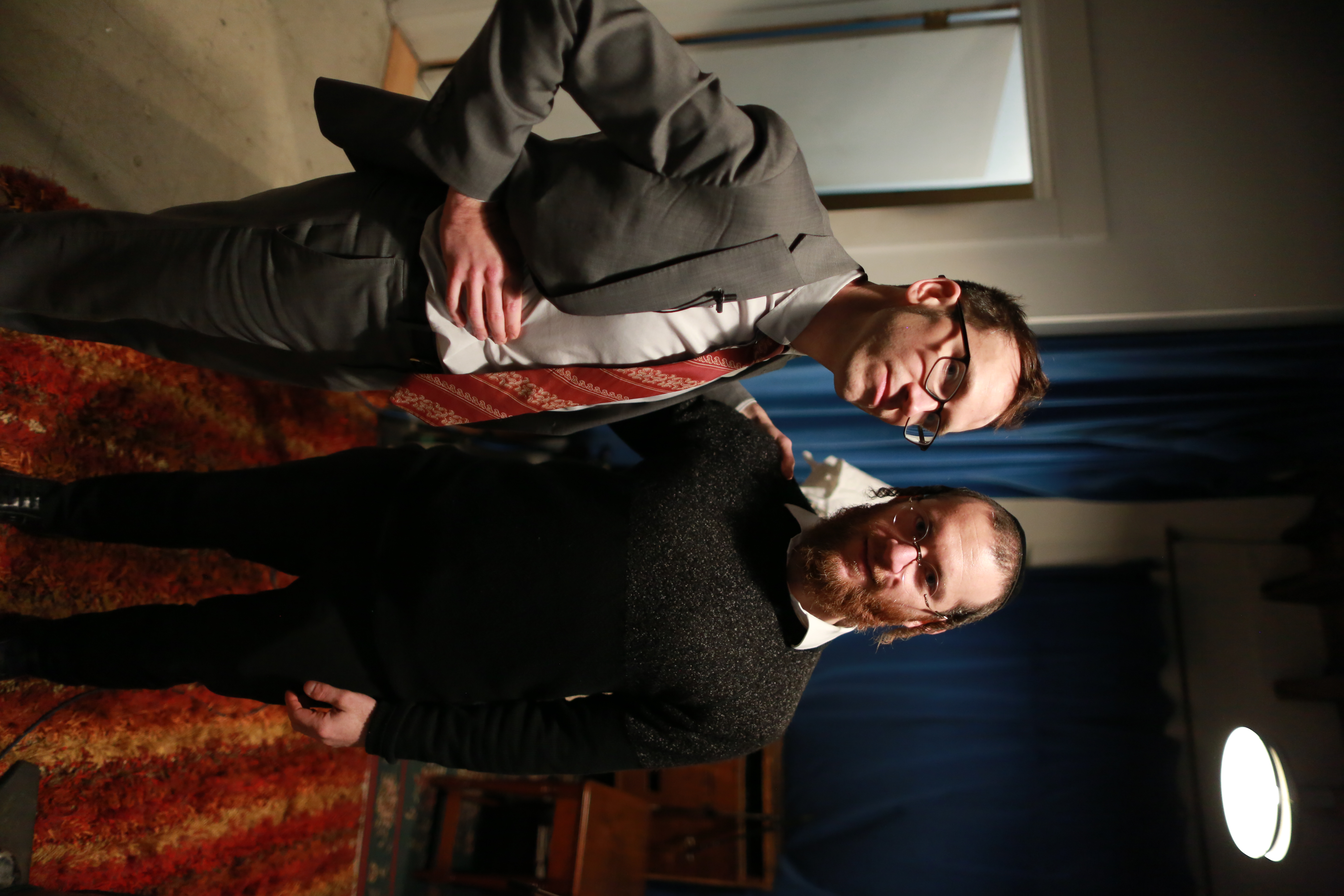
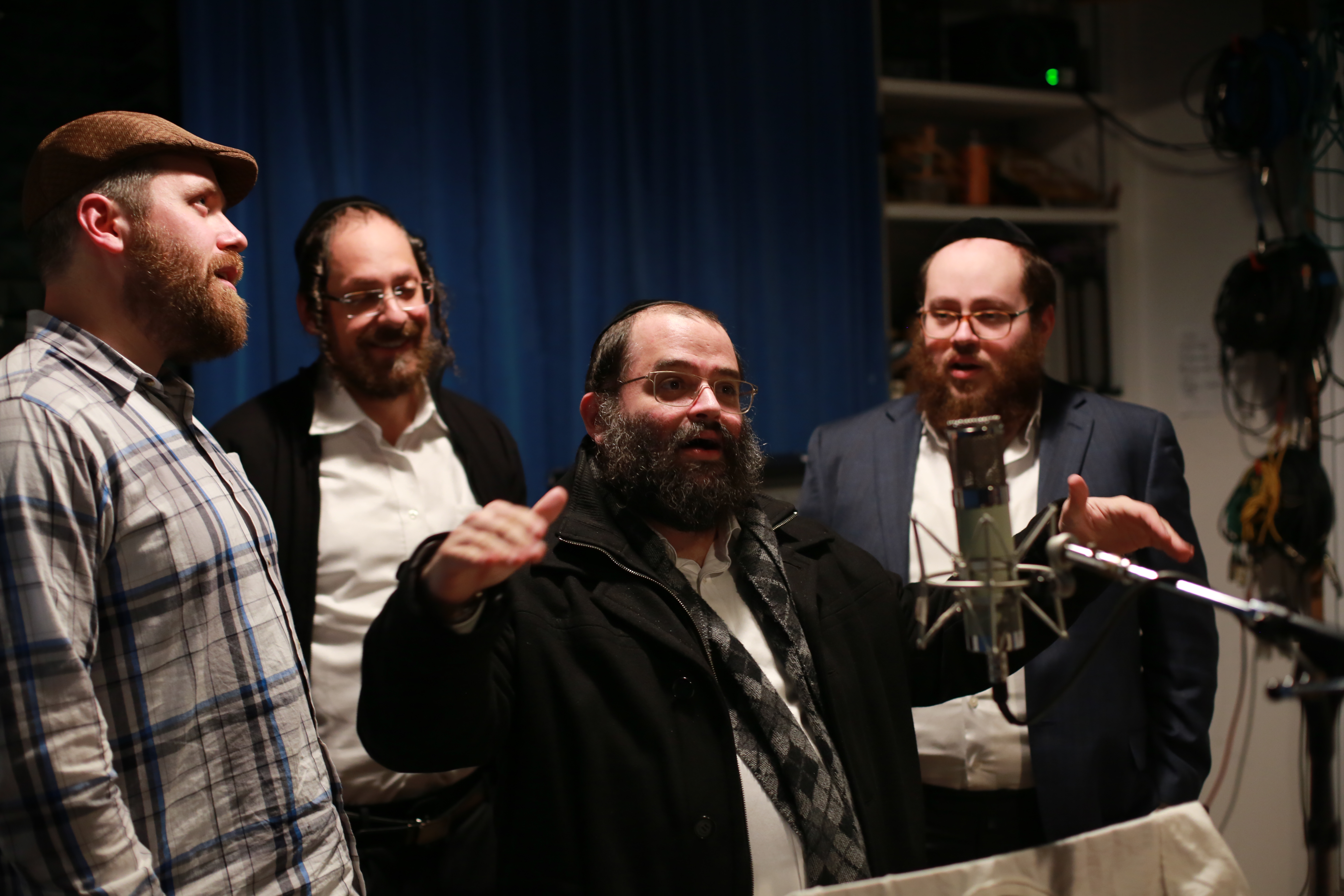
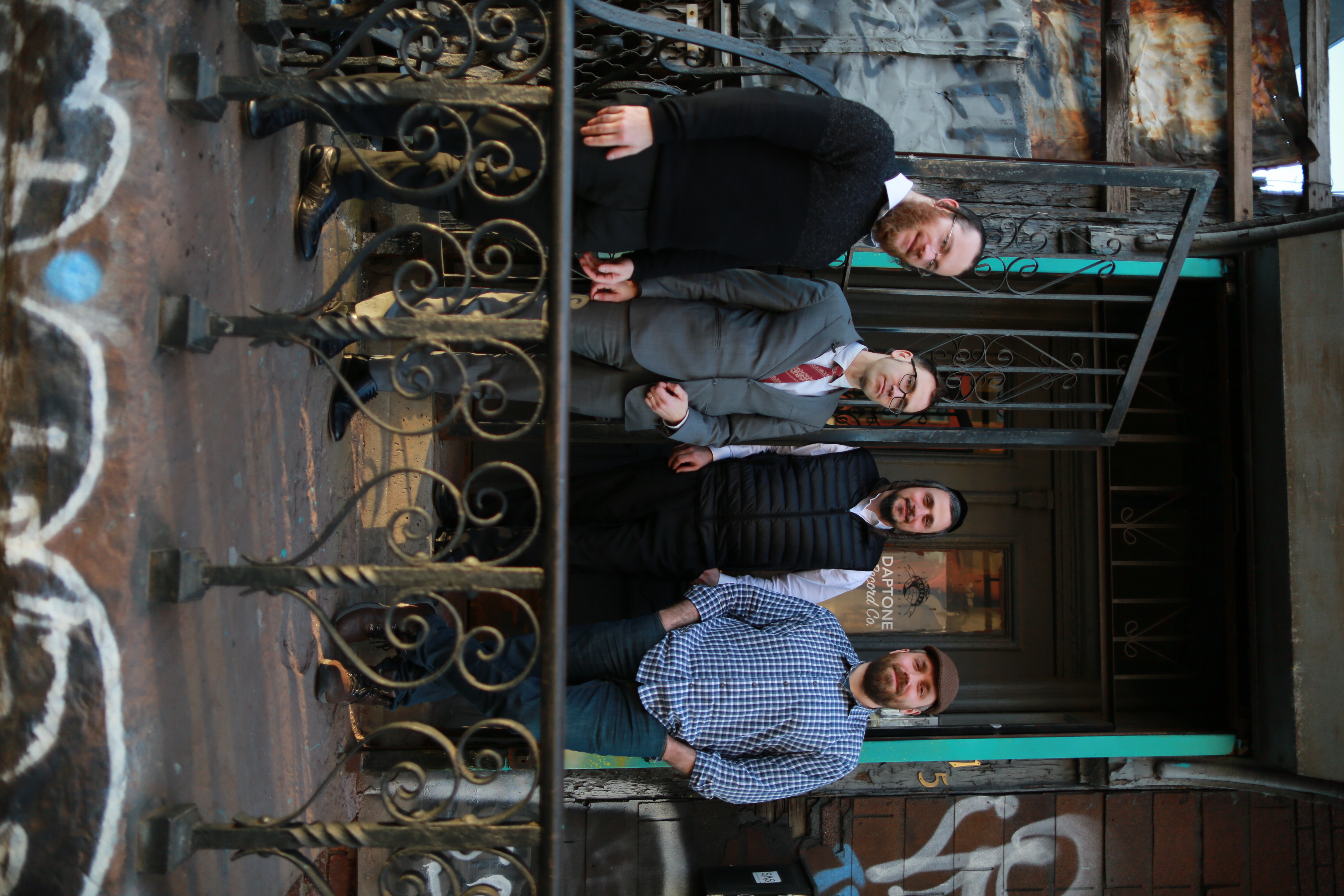
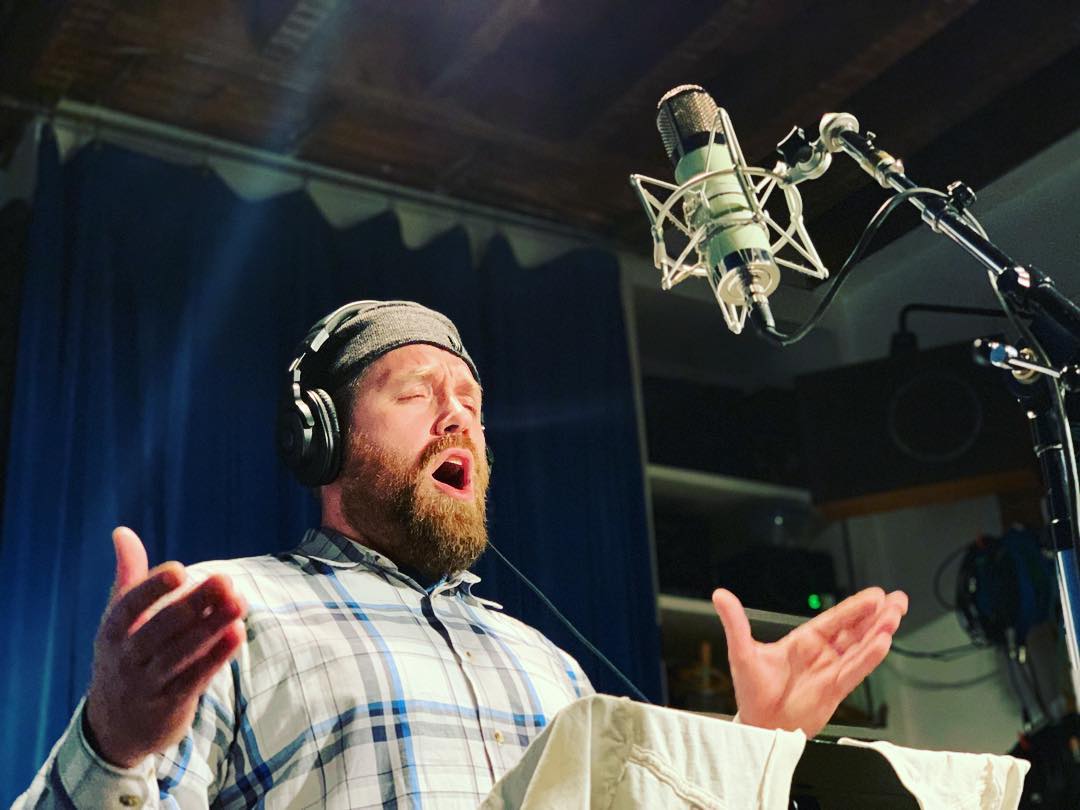
Photographs by Tatiana McCabe.
Side A
1. Yanky Lemmer – Shomea Kol Bichiyos (Samuel Malavsky)
Yaakov “Yanky” Lammer is the exemplary figure in the current Brooklyn Chassidic cantorial scene. He grew up in a Belz Chassidic family with no tradition of music performance but learned an intense appreciation of classic cantorial records from his father. Growing up, according to Yanky, he was the only “oddball” among his friends who loved cantorial music. Today he is one of the best-known cantors in the world and holds the prestigious pulpit position at the Lincoln Square Synagogue in Manhattan.
Shomea Kol Bichiyos is found in the liturgy for the Nilo concluding service of Yom Kipur. The prayer addresses God as “the One who hears a voice full of tears.” This text has been imagined by cantors as representative of their special mandate to reach the hearts of the people through extremes of emotion and to elicit tears as part of the prayer leading process. Yanky’s rendition is based on a composition by Samuel Malavsky (1894-1983), recorded in 1935.
2. Shimmy Miller – Yehi Rotzon (Miller)
Shimon “Shimmy” Miller is a third-generation cantor, born into a Bobov Chassidic family well-known for its deep musical roots. His father, Benzion Miller, is the cantor at Beth El Synagogue in Borough Park, Brooklyn, a holdout of cantorial culture where one Sabbath a month, on the day for blessing the new moon, a cantorial service is held in a style of improvised virtuoso performance that is virtually unheard of in contemporary America. For years, Shimmy led the choir at Beth El, creating a training ground for young cantors and serving as a special source of inspiration for young Chassidic singers. Yanky Lemmer, among other prominent performers in the scene, was a Beth El choir member.
This setting of the special liturgy recited on the Sabbath preceding the blessing of the new moon is Shimmy’s own composition and is steeped in the special atmosphere of Beth El and its century-long culture of cantorial performance.
3. Yossi Pomerantz – V’al Y’dey Avodecha (Sholom Katz)
Yosssi Pomerantz is the only singer on this album not born in Brooklyn. He is an Israeli-born artist with a trans-national career who grew up singing in Chassidic choirs. He later attended the Tel Aviv Cantorial Institute, offering a contrast to the New York Chassidic scene in which cantors are typically not trained in seminary-based schools for cantors. Pomerantz’s massive tenor voice was described succinctly by Yoel Kohn with the words, “He’s God.”
Sholom Katz (1915-1982) is perhaps best remembered for a story with mythological overtones about his brush with death during the Holocaust. According to Katz, he and a group of Jewish prisoners were about to be executed; he asked the Nazi guards for permission to sing El Maley Rachamim, the memorial prayer, for himself and the others. The guards were so moved by his performance that they spared his life. All the others were murdered.
4. Yoel Kohn – Kulam Ahuvim (Gershon Sirota/Meier Boruch Kohn)
Yoel Kohn grew up in Satmar Chassidic Williamsburg in a family of singers, the son of Meier Boruch Kohn, a well-known bal tefilo (prayer leader). After following in his father’s footsteps, singing in community synagogues, Yoel made the decision as an adult to leave the community. Yoel’s identity as a Chassidic cantor who no longer identifies as religious presents unique challenges to his career, but his remarkable talent has kept him connected to his birth community, especially through performances at parties on the fringe of the communal structure.
Yoel’s rendition of Kulam Ahuvim, a text in the Sabbath morning service, draws on themes from a recording of this prayer by Gershon Sirota (1874-1943), the first international star of Jewish recorded music, and from his father’s approach to the same piece.
5. Yanky Lemmer – Moron D’vishmayo (Zawel Kwartin)
Zawel Kwartin (1874-1952) is a critical figure in the development of the recorded cantorial style that theatrically distills synagogue prayer leading into concise and emotionally decisive compositions tailored to the time limits of a 78rpm record. In his writings, Kwartin presented himself as a traditionalist whose music preserves the sounds of small-town prayer leaders he heard growing up and legendary figures of nineteenth century Russian Jewish synagogue music. Yanky Lemmer compares his work as a revivalist of old cantorial recorded repertoires to Kwartin’s musical rebellion against the choral music that was in fashion in elite urban synagogues when he was an up-and-coming star. Moron D’vishmayo is a text from the Selichos penitential service recited during the week before Rosh Hashana.
Side B
1. Yoel Kohn – L’olam Yehey Odom (Yehoshua Wieder)
Yoel’s family has a special connection to the Hungarian cantor Yehoshua Wieder (1906-1964). Yoel’s grandfather was a meshoyrer (cantorial choir singer) for Wieder’s father, Asher Wieder. As a result, Yoel and his father possess knowledge of otherwise lost repertoire from the Wieder cantorial family. L’olam Yehey Odom was recorded by Wieder in the 1950s after surviving the Holocaust and immigrating to the United States. The text which is found in the preliminary morning service for weekdays, echoes Ecclesiastes with its meditation on the ephemerality of human life, asking “What are we? What is our life? What is our strength?” and answering, “the superiority of man to animal is false; all is vanity.”
2. Yoel Pollack – Shomer Yisroel (Yossele Rosenblatt)
Yoel Pollack, a cousin of Yoel Kohn, is a prayer leader in the Satmar Chassidic community and a composer of nigunim (devotional melodies) that are sometimes performed at mass gatherings presided over by the Satmar Rebbe. Here, Pollack performs a piece by Yossele Rosenblatt (1882-1933), one of the best-known cantors whose recordings crossed over into the mainstream market and who appeared in the first sound film, The Jazz Singer, in 1927. Surprisingly, given Rosenblatt’s prominence in the secular music industry, Rosenblatt is remembered today as emblematic of cantorial piety and purity. This may be due in part to the fact that unlike other cantors who presented as secular with clean shaven faces, Rosenblatt retained his Chassidic image throughout his career. Shomer Yisroel was composed by Rosenblatt as a fund raiser for Jewish victims of World War One and released on record in 1920. On this rendition, Yoel Pollack is joined by David Reich in a harmonized chorus that recalls the sentimental sweetness of contemporary Chassidic pop music.
3. David Reich – Eso Eynay (Mordecai Yardeini)
Born and raised in the Brooklyn Satmar community, David Reich is a deep listener to cantorial records who came to the music by accident after discovering a cassette as a young teenager while helping his parents clean beneath the laundry machine. According to David, cantorial music fulfilled a deep need, “I didn’t know what I was craving until I found it.” David’s primary musical activity is serving as an accompanist at cantorial jam sessions; he can be heard playing the keyboard and providing backing vocals throughout this record. Eso Eynay is a setting of Psalm 121, composed by Mordecai Yardeini (1908-1982), but made famous by Moshe Koussevitzky (1899-1965) who recorded the composition several times over the course of his career. Koussevitzky has exerted a powerful influence on cantors in the current generation in part because of his celebrated operatic tenor voice.
4. Shimmy Miller – Habeyn Yakir Li (Aaron Miller/Shimmy Miller)
This setting of a text from the prophet Jeremiah (31:20) recited in the Rosh Hashana musaf service is a collaboration across generations. The choral introduction was composed by Shimmy’s grandfather, a well-known cantor in the Bobov community, with Shimmy providing an improvised recitative response to his grandfather’s melody.
5. Yanky Lemmer – Tiher Rabi Yishmael (Zawel Kwartin)
Kwartin’s 1928 recording Tiher Rabi Yishmael is a setting of an excerpt from the Eileh ezkoro service from Yom Kipur that memorializes rabbis who were martyred by the Romans and that has been repurposed by Jews across centuries as a prayer for victims of persecution and hate. In this text, Rabbi Yishmael is positioned at the center of a mystical drama. As a member of a high priestly family, he is in possession of knowledge of the secret name of God which holds mystical powers. He speaks the secret name and ascends to heaven, where he confronts God, asking how such senseless violence can be permitted. Yishmael is given no answer. Instead of a theological commentary on the phenomenon of evil and the suffering of the righteous, Kwartin’s composition offers a cosmic wail that speaks across history, framing the cantor’s voice as the place where terrifying paradoxes can be articulated.
Funding for this project was generously provided by the Taube Center for Jewish Studies at Stanford University. Special thanks to Dr. Ari Kelman for approving the project and Elayne Weissler-Martello for providing superb logistical support.
Credits
Yanky Lemmer, Shimmy Miller, Yossi Pomerantz, Yoel Kohn, Yoel Pollack, David Reich – cantors
David Reich – organ and piano
Jeremiah Lockwood – organ (Moron D’Vishmayo, Tiher Rabi Yishmael)
David Reich, Yoel Kohn, Zevi Steiger, Yossi Pollack – choir (Yehi Rotzon, Habeyn Yakir Li)
Produced by Jeremiah Lockwood
Recorded at Daptone Studio, Brooklyn, NY, January 13-15, 2019
Mixed at Penrose Studio, Riverside Studio, Riverside, CA, March 21-23, 2019
Recorded and mixed by Gabe Roth